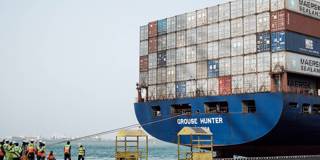While many observers have touted the African Continental Free Trade Area as a game changer for the continent, trade liberalization alone will not necessarily guarantee economic success. Member countries must also implement robust trade facilitation measures, and engage with external partners as a unified trading bloc.
CAIRO – The African Continental Free Trade Area (AfCFTA), which entered into force on January 1 last year, promises to accelerate the diversification of the region’s economies and reduce the impact of commodity-price cycles on growth. Whereas Africa’s external trade is dominated by primary commodities and natural resources, the first shipment under the AfCFTA – from Ghana to South Africa – comprised manufactured goods of the sort that largely drive intra-African trade.
Many therefore hope that the AfCFTA – by creating a single market of 55 countries with a total population of more than 1.3 billion and a combined GDP of $3.4 trillion – will catalyze industrialization as firms take advantage of economies of scale to spread the risk of investing in smaller markets. To that end, the trade agreement will eliminate tariffs on 90% of goods (the ultimate goal is 97% liberalization).
The AfCFTA will likely boost foreign direct investment across Africa – empirical evidence elsewhere shows that joining a free-trade area could increase it by around a quarter – and shift its emphasis from natural resources toward labor-intensive manufacturing industries. Moreover, the pact has the potential to transform African economies, significantly increase the continent’s share of global trade, and strengthen its bargaining power in international trade negotiations.

CAIRO – The African Continental Free Trade Area (AfCFTA), which entered into force on January 1 last year, promises to accelerate the diversification of the region’s economies and reduce the impact of commodity-price cycles on growth. Whereas Africa’s external trade is dominated by primary commodities and natural resources, the first shipment under the AfCFTA – from Ghana to South Africa – comprised manufactured goods of the sort that largely drive intra-African trade.
Many therefore hope that the AfCFTA – by creating a single market of 55 countries with a total population of more than 1.3 billion and a combined GDP of $3.4 trillion – will catalyze industrialization as firms take advantage of economies of scale to spread the risk of investing in smaller markets. To that end, the trade agreement will eliminate tariffs on 90% of goods (the ultimate goal is 97% liberalization).
The AfCFTA will likely boost foreign direct investment across Africa – empirical evidence elsewhere shows that joining a free-trade area could increase it by around a quarter – and shift its emphasis from natural resources toward labor-intensive manufacturing industries. Moreover, the pact has the potential to transform African economies, significantly increase the continent’s share of global trade, and strengthen its bargaining power in international trade negotiations.